
Hootie & the Blowfish is an American rock band formed in Columbia, South Carolina, in 1986. The band's lineup for most of its existence has been the quartet of Darius Rucker, Mark Bryan, Dean Felber, and Jim Sonefeld. The band went on hiatus in 2008 until they announced plans for a full reunion tour in 2019 and released their first new studio album in fourteen years, Imperfect Circle.

"Head over Feet" is a song by Canadian singer-songwriter Alanis Morissette, taken from her third studio album Jagged Little Pill (1995). Written by Alanis and Glen Ballard, and produced by Ballard, it was released as the album's fifth single in July 1996 and presented a softer sound than the previous singles from the album. "Head over Feet" talks about being best friends and lovers with someone at the same time, with Alanis thanking them for their manners, love and devotion.
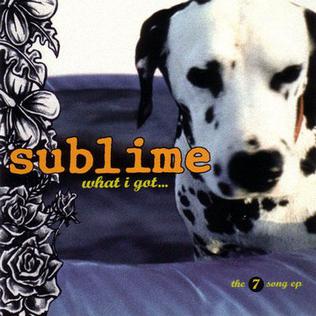
"What I Got" is a song from American band Sublime's self-titled third album (1996). It was released after singer Bradley Nowell's death in 1996 from a heroin overdose and became the band's biggest radio hit. It was the second single to be released by the band, following "Date Rape" in 1991. The song's chorus is a lift from "Loving" by reggae artist Half Pint, who is credited as a co-writer. The song's melody is similar to the Beatles' "Lady Madonna".
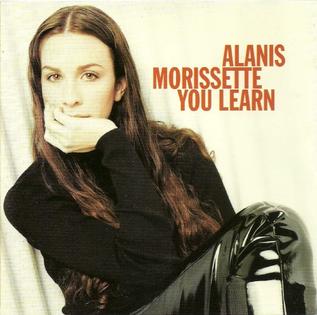
"You Learn" is a song by Canadian singer-songwriter Alanis Morissette from her third studio album, Jagged Little Pill (1995). It was written by Morissette and Glen Ballard, the album's producer. Maverick and Warner Bros. Records released the song as the album's fourth single. The lyrics state that valuable lessons are learned from poor decisions. The album title is taken from this song's line "Swallow it down ".

"Sunny Came Home" is a folk-rock song by American musician Shawn Colvin. It is the opening track on her 1996 concept album, A Few Small Repairs, shipped to radio in February 1997, and was released as a CDcassette single on June 24, 1997. In the United Kingdom, the song was originally released in July 1997 but did not chart until a re-release in May 1998.

"If You Go" is a song written by Jon Secada and Miguel Morejon, recorded for Secada's second English-language album, Heart, Soul & a Voice (1994). The song's lyrics detail a desire that a female subject not leave the singer, for, if she does, "there'll be something missing in [his] life." A Spanish version, "Si te vas", was also released for the Spanish-language market.

"Only Wanna Be with You" is a song by American alternative rock band Hootie & the Blowfish. After being included on the group's EP Kootchypop (1993), it was released in July 1995 as the third single from their breakthrough album, Cracked Rear View (1994). It peaked at number six on the US Billboard Hot 100, number one on the Billboard Top 40/Mainstream chart, number three on the Billboard Adult Contemporary chart, and number two on the Billboard Album Rock Tracks chart.

"Barely Breathing" is a song by American singer-songwriter Duncan Sheik from his eponymous debut studio album (1996). It was released as the lead single from the album on May 3, 1996, by Atlantic Records. Sheik is the sole writer of the song, while production was helmed by Rupert Hine. The song became a chart hit in North America in early 1997, receiving several accolades in the years following its release.

"Carnival" is a song written and produced by singer-songwriter Natalie Merchant and was the lead single from her debut solo album, Tigerlily (1995). In the lyrics, the protagonist describes a street scene as a carnival. Merchant was inspired to write the song after visiting New York City for the first time when she was 16, claiming she was fascinated with the residents' unusual lifestyles, as she grew up in rural areas.

"Let Her Cry" is a song by American rock band Hootie & the Blowfish. It was released in December 1994 as the second single from their debut album, Cracked Rear View (1994), and became a top-10 hit in Australia, Canada, Iceland, and the United States. The song received the Grammy Award for Best Pop Performance by a Duo or Group with Vocals in 1996.
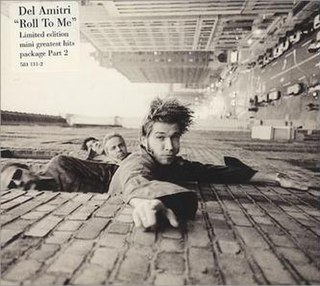
"Roll to Me" is a song by Scottish pop rock band Del Amitri, released as the third single from their 1995 album, Twisted. The song became their biggest hit in the United States when it reached number 10 on the Billboard Hot 100 chart. It was a moderate hit in the United Kingdom, peaking at number 22 on the UK Singles Chart.
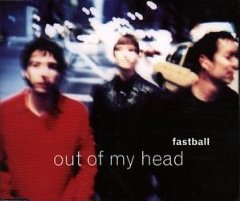
"Out of My Head" is a song by the American band Fastball from their second studio album, All the Pain Money Can Buy (1998). The song is a rock ballad with gospel influence, dominated by Hammond organ and piano. Bassist Tony Scalzo is the lead singer on the song, with guitarist Miles Zuniga coming in with harmony during the last chorus. The song was serviced to American rock radio in January 1999 and to contemporary hit radio two months later.
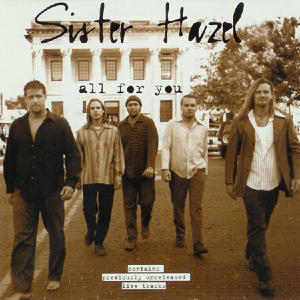
"All for You" is the debut single of American alternative rock band Sister Hazel, originally appearing on their eponymous debut album. In 1997, the song was re-recorded for their second album, ...Somewhere More Familiar. It peaked number 11 on the US Billboard Hot 100, number two on Canada's RPM 100 Hit Tracks chart, and number 10 in Iceland. It also charted in Australia, where it spent two non-consecutive weeks at number 50.
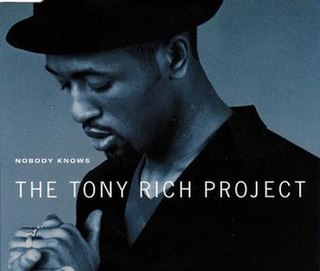
"Nobody Knows" is a song by R&B singer Tony Rich from his 1996 debut album, Words. Released as his debut single on November 7, 1995, the song peaked at number two on both the Billboard Hot 100 and Billboard Hot Adult Contemporary Tracks charts. It also became a hit in several other countries, topping the Irish Singles Chart and reaching number two in Australia and Canada, number four in the United Kingdom, and the top 20 in the Netherlands, New Zealand, and Sweden. Rich received a nomination for the 1997 Grammy Award for Best Male Pop Vocal Performance.

"Wonder" is a song by Natalie Merchant, released in 1995 as the second single from her solo album Tigerlily. The single reached number 20 on the US Billboard Hot 100 and number 10 on the Canadian RPM 100 Hit Tracks chart, outperforming her previous single "Carnival" in Canada. The covers for the U.S. and European singles were different. The single also includes live cuts from Merchant's tour.

"Give Me One Reason" is a song written and performed by American singer-songwriter Tracy Chapman. It was included on her fourth studio album, New Beginning (1995), and was released as a single in various territories between November 1995 and March 1997, her first since 1992's "Dreaming on a World". The song is Chapman's biggest US hit, reaching number three on the Billboard Hot 100. It is also her biggest hit in Australia, where it reached number three as well, and it topped the charts of Canada and Iceland. Elsewhere, the song reached number 16 in New Zealand, but it underperformed in the United Kingdom, peaking at number 95 in March 1997.

"In the Meantime" is the debut single of English alternative rock band Spacehog, from their debut album, Resident Alien (1995). It samples the Penguin Cafe Orchestra song "Telephone and Rubber Band". Released in 1996, the single peaked atop the US Billboard Mainstream Rock chart and the UK Rock Chart. It additionally reached number 32 on the Billboard Hot 100 and number 29 on the UK Singles Chart while reaching the top 50 in Australia, Canada, Iceland, New Zealand and Sweden.

"Hold My Hand" is the debut single of the American alternative rock band Hootie & the Blowfish from their album Cracked Rear View. All four of the band members wrote the song sometime in 1989, and it was released on a self-titled cassette EP the year after. Released in July 1994, "Hold My Hand" charted at number 10 on the US Billboard Hot 100. The song includes a backing vocal from David Crosby.
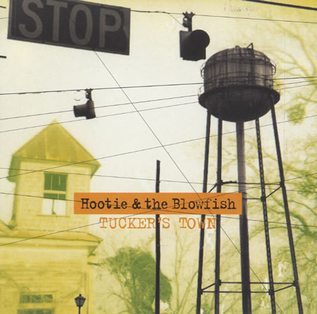
"Tucker's Town" is a song by American rock group Hootie & the Blowfish. It was released on June 25, 1996, as the second single from their second album, Fairweather Johnson (1996). In the United States, it peaked at number 38 on the Billboard Hot 100, number 24 on the Billboard Adult Contemporary chart, and number 29 on the Billboard Mainstream Rock chart. Outside the US, "Tucker's Town" reached number two in Canada—ending 1996 as the country's 25th-most-successful single—and number 20 in Iceland.

"Old Man & Me " is a song by American rock group Hootie & the Blowfish. It was released in April 1996 as the lead single from their second album, Fairweather Johnson. In the United States, it peaked at number 13 on the Billboard Hot 100, number 18 on the Billboard Adult Contemporary chart, and number six on the Billboard Mainstream Rock chart. The song also reached number one in Canada, becoming the band's third and final single to do so.




















